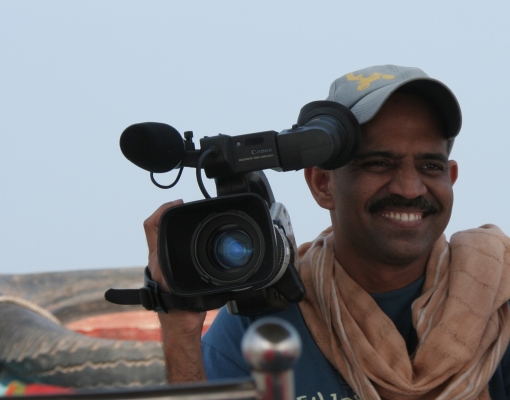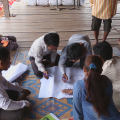Gender and social equity (GSE) in water governance research in the Mekong
Gender and social equity (GSE) are essential components of SUMERNET research. Using examples from SUMERNET, this piece explores how water governance research can recognize and amplify the voices of marginalized people especially women from ethnic minorities, or who are economically and politically disadvantaged.
Transboundary natural resource governance cannot be gender blind if it is to be effective and equitable—and researchers have a critical role. Gender and social equity (GSE) are essential components of research conducted in the SUMERNET program.
The value of a GSE lens to SUMERNET research outcomes and quality can be identified as being three-fold: effectiveness, voice and equity, and research quality.
GSE is a critical aspect for consideration in the water-energy-food (WEF) nexus. Integrating GSE can make the policy and programmes more effective in addressing the various social and ecological challenges faced by the communities in the Mekong Region.
Applying a GSE lens in SUMERNET research projects provides the diverse research teams across the Mekong Region with the opportunity to amplify those voices that are unlikely to be heard.
SUMERNET research identifies and illuminates social and gender implications through the investigation of the social implications of development projects, policies and decisions made by the country governments in the Mekong Region.
The research projects under SUMERNET play the valuable role of recognizing and amplifying the voices of marginalized people to advocate for equity, such as women from ethnic minorities, with low education attainment, who are economically and politically disadvantaged.
For instance, in “Listening to voices on the margins: lessons from the COVID-19 crisis for improving access to clean water for drinking and hygiene in the Mekong Region”, the project’s GSE lens helped ”identify effective ways to improve access to clean water for drinking and hygiene of vulnerable people on the margins, by listening closely to their stories of responding to the impacts of the COVID-19 outbreak”.
The value of the GSE lens also relates to the quality of research. Specifically, paying attention to GSE enhances the rigor of research by improving the sampling and the accuracy of the data and interpretation. This includes unpacking differences (or commonalities) in needs, priorities, risk tolerance, capacities, experiences, interests and so forth of people of different genders and socio-economic groups. This is essential as a foundation for evidence-based policy and programs that are effective and that avoid the common pitfall of focusing on dominant group actors, and unintentionally worsening social and gender gaps.
Previous studies exploring gender dimensions of water insecurity and governance in the Lower Mekong Region (Nguyen et al., 2019 https://www.sei.org/publications/exploring-gender-dimensions-of-water-insecurity-and-governance-in-the-lower-mekong-region/), raised concerns on the continued exclusion of women’s roles and voices in decision-making.
SUMERNET projects address this concern through various research methodological approaches. For example, “Bringing more than food to the table: precipitating meaningful change in gender and social equity-focused participation in transboundary Mekong Delta wetlands management” (BRIMOFOT) in Cambodia and Vietnam used a Participatory Action Research methodology. Trhough this, BRIMOFOT ensured the representation and participation of women and ethnic minorities, thereby improving the equitable representation and participation of these key groups in decision-making.
Ultimately, the continued application of a GSE lens in SUMERNET research ensures the inclusion of women and other marginalized groups in decision-making and provides evidence and insights to improve policy and practice on water governance.
Applying a GSE lens helps communicate the lived experiences and perspectives of diverse actors, particularly people from marginalized genders or socio-economic groups and bring local concerns, best practices, or policy recommendations to shape decision-making over transboundary natural resources in the Mekong Region.
Info
This story is part of the following project
SUMERNET 4 All: Engaging with water insecurity in the Mekong Region
Topic
Country
Related people
You might be interested in
-
SUMERNET Vision Guide introducing the new phase "SUMERNET 4 All"
The new, revised "Vision Guide" for SUMERNET is now available. This vision guide presents an overview of SUMERNET - its origins and governance structure, background to the network, aims, key research areas, engagement with policy, and outreach products
![SUMERNET Vision Guide introducing the new phase "SUMERNET 4 All"]()
-
SUMERNET 4 All Call for Proposals on Joint Action
SUMERNET 4 All (S4A) provides financial support and technical assistance to consortia of researchers and boundary partners from the Mekong Region
![SUMERNET 4 All Call for Proposals on Joint Action]()
-
SUMERNET launches redesigned website to provide a fresh visual look and direction
SUMERNET is proud to announce the launch of our redesigned website to coincide with our new phase of work on addressing water insecurity in the Mekong Region.
![SUMERNET launches redesigned website to provide a fresh visual look and direction]()

 By
By





 Read more about SUMERNET
Read more about SUMERNET
